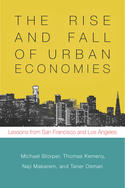At a time when technology and public opinion should be expanding the boundaries of innovation and self-expression, we appear to be entering a new era of ever greater economic and political centralization, Wendell Cox and I suggest in a new paper. read more »
California
How to Reform the California Legislature and Restore Power to the People
The Western states, and California in particular, have had a long history of spearheading progressive reforms, especially in their electoral and governmental systems. A former Governor of California, Hiram Johnson, actually ran with Theodore Roosevelt on the Progressive Party presidential ticket of 1912. If you are looking for reform ideas, look no further than the Golden State. read more »
- Login to post comments
Palo Alto and the Tech Shop of Horrors
This piece by Zelda Bronstein (original to 48hills.org) goes behind the story of the Peninsula planning commissioner who made national news by saying she had to leave town to buy a house for her family.
On August 10, Kate Vershov Downing, a 31-year-old intellectual-property lawyer, set the media aflutter when she posted on Medium a letter to the Palo Alto City Council stating that she was resigning from the city’s Planning Commission because she was moving to Santa Cruz. The reason for her move: She and her 33-year-old husband Steven, a software engineer, couldn’t find a house they could afford to buy in Palo Alto. Downing said that they currently rented a place with another couple for $6,200 a month, and that if they “wanted to buy the same house and share it with children and not roommates, it would cost $2M.” read more »
- Login to post comments
California's Boom Is Poised To Go Bust -- And Liberals' Dream Of Scandinavia On The Pacific
As its economy started to recover in 2010, progressives began to hail California as a kind of Scandinavia on the Pacific — a place where liberal programs also produce prosperity. read more »
California for Whom?
“Old in error,” writes historian Kevin Starr, “California remains an American hope.” Historically, our state has been a beacon to outsiders seeking a main chance: from gold miners and former Confederates to Midwesterners displaced by hardship, Jews seeking opportunity denied elsewhere, African Americans escaping southern apartheid, Asians fleeing communism and societal repression, Mexicans looking for a way out of poverty, counter-culture émigrés looking for a place where creation can overcome repression. read more »
- Login to post comments
California: The Economics of Delusion
In Sacramento, and much of the media, California is enjoying a “comeback” that puts a lie to the argument that regulations and high taxes actually matter. The hero of this recovery, Gov. Jerry Brown, in Bill Maher’s assessment, “took a broken state and fixed it.” read more »
- Login to post comments
California's State Religion
In a state ruled by a former Jesuit, perhaps we should not be shocked to find ourselves in the grip of an incipient state religion. Of course, this religion is not actually Christianity, or even anything close to the dogma of Catholicism, but something that increasingly resembles the former Soviet Union, or present-day Iran and Saudi Arabia, than the supposed world center of free, untrammeled expression. read more »
A 'Diet' to Give California Drivers Indigestion
In the past, it was other people’s governments that would seek to make your life more difficult. But increasingly in California, the most effective war being waged is one the state has aimed at ourselves. read more »
- Login to post comments
SF Vs LA: Different Strokes In Urban Development
Book Review: "The Rise and Fall of Urban Economies: Lessons from San Francisco and Los Angeles." Michael Storper, Thomas Kemeny, Naji P. Makarem and Taner Osman; Stanford University Press, 2015.
How and why do places differ in their pace of economic development? Why do some flourish while others lag? These are among the most profound questions in economics and related fields. Are explanations found in geography, culture, institutions, or fortune? read more »
- Login to post comments
California’s High-Speed Rail Authority Wins Dishonor of the California Golden Fleece Award
The California High-Speed Rail Authority (CHSRA) has won the Independent Institute’s first California Golden Fleece Award for its lack of transparency and history of misleading the public about key details of the state’s “bullet-train” project, which no longer reflect what voters approved in 2008. read more »
- Login to post comments






















